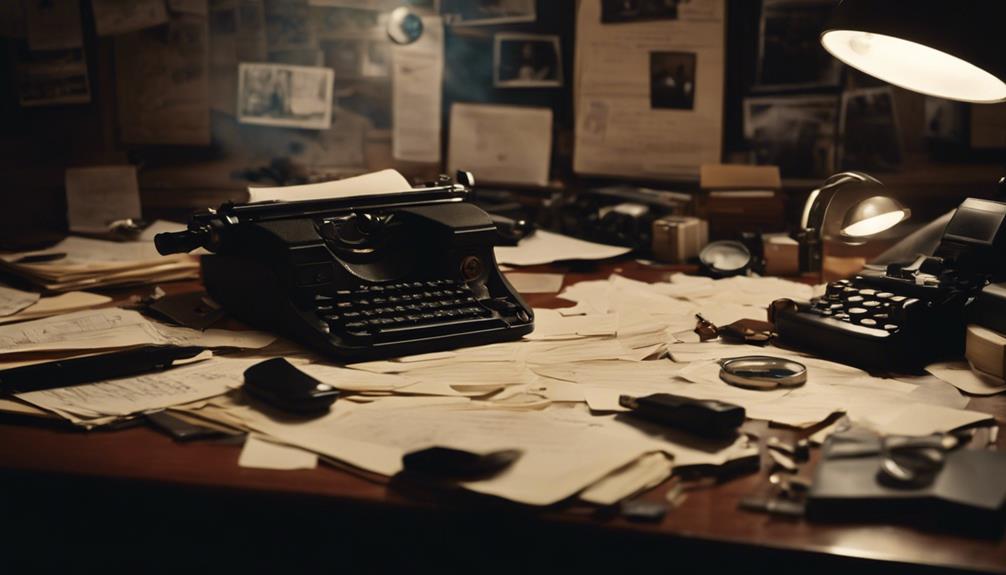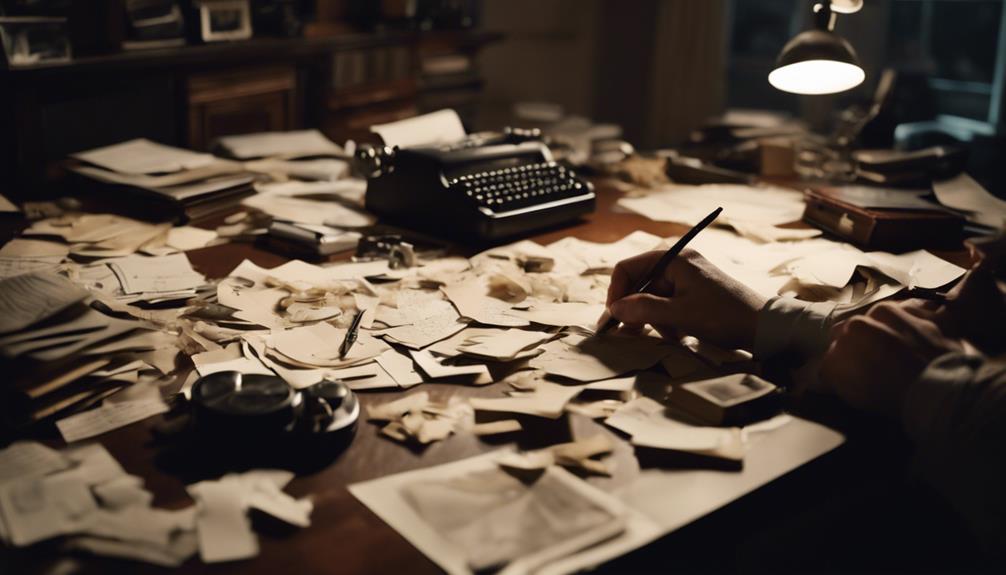Cheating
Private Eyes Uncover Secrets of Cheating Partners
Lurking in the shadows, private investigators uncover the shocking truth behind cheating partners, exposing the secrets they desperately try to conceal.

Private investigators specializing in infidelity cases utilize a range of sophisticated techniques to expose the secrets of cheating partners. They trace suspicious online activities, detect hidden social media accounts, and utilize specialized computer databases to capture emails, chatroom conversations, and web searches. Physical surveillance techniques are also employed, combining discreet monitoring of daily activities with hidden cameras and forensic analysis. By meticulously gathering incriminating evidence, private eyes can reveal hidden secrets, analyze digital footprints, and expose deceptive behavior. As they relentlessly pursue the truth, the intricate web of lies and deceit begins to unravel, revealing the shocking reality of cheating partners.
Key Takeaways
• Private investigators employ sophisticated methods to uncover online infidelity, tracing suspicious activities and detecting hidden social media accounts.
• Discreet physical surveillance is used to monitor daily activities, track expenses, and capture evidence of infidelity.
• Specialized equipment and software are utilized to gather incriminating evidence, analyze digital footprints, and expose hidden secrets.
• Investigators analyze bank statements, login histories, and cryptic messages to identify suspicious behavior and uncover deceptive patterns.
• By combining digital monitoring and physical surveillance, private eyes can unveil the intricate web of lies and deceit, exposing cheating partners.
Uncovering Online Infidelity
With the rise of online platforms, private investigators have developed sophisticated methods to uncover the digital footprint of cheating partners. They trace suspicious online activities and detect hidden social media accounts.
They utilize specialized computer databases to conduct thorough background checks, revealing potential red flags. Additionally, specialized equipment can detect if a partner is using pornography or dating websites, capturing emails, chatroom conversations, and web searches.
It's also possible to uncover if a partner has registered on dating sites, providing concrete evidence of infidelity. By leveraging these digital tools, private investigators can piece together a detailed picture of a cheating partner's online activities.
Physical Surveillance Techniques

Private investigators employ a range of thorough physical surveillance techniques to gather evidence of infidelity. This includes conducting discreet domestic surveillance and tracking suspicious expenses on bank statements. They meticulously monitor a cheating partner's daily activities, identifying patterns and anomalies that may indicate deception.
Discreetly installed hidden cameras, disguised as everyday objects, can capture incriminating footage. By tracking a partner's movements and financial transactions, investigators can piece together a timeline of deceit. Physical surveillance techniques are often used in conjunction with digital monitoring to build a detailed case against a cheating partner.
These methods can provide solid evidence, which can have a significant impact on divorce settlements and custody battles.
Gathering Incriminating Evidence

They meticulously gather incriminating evidence, piecing together a detailed picture of deception. Private investigators use specialized equipment to uncover hidden secrets, such as devices that capture emails, chatroom conversations, and web searches.
They analyze bank statements to reveal expenses on affairs, like dinners, gifts, or trips. High-tech hidden cameras, disguised as common household items, can provide concrete evidence. Investigators also conduct domestic surveillance, following suspects to capture evidence in various locations.
Exposing Hidden Secrets

During the investigation, hidden secrets are relentlessly pursued as private investigators dig deeper into the digital and physical trails left behind by cheating partners. They uncover hidden social media accounts, secret emails, and cryptic text messages that can reveal infidelity.
Specialized equipment and software help detect and analyze digital footprints, exposing hidden online activities. Meanwhile, physical surveillance and forensic analysis of personal belongings can uncover tangible evidence of cheating.
Unveiling Deceptive Behavior

As digital breadcrumbs and tangible clues are meticulously analyzed, a detailed picture of a cheating partner's deceptive behavior begins to emerge. Private investigators uncover subtle yet telling signs of infidelity, from suspicious login histories to cryptic text messages.
By examining financial records, they can identify excessive expenditures on lavish gifts or secret getaways. Additionally, hidden cameras and surveillance tactics can capture incriminating evidence, revealing the extent of a cheating partner's deception.
As the investigation unfolds, a detailed portrait of the cheating partner's behavior takes shape, exposing the intricate web of lies and deceit.
Frequently Asked Questions
Can Private Investigators Help Me With Emotional Support During the Investigation?
Private investigators primarily focus on gathering evidence, but they can offer some emotional support during the investigation. They may provide guidance on how to cope with the situation, but their primary role is to uncover facts, not provide counseling.
Having a support system, such as friends, family, or a therapist, is crucial to help process emotions while the investigator handles the fact-finding.
How Do Private Investigators Ensure They Are Not Invading the Target's Privacy?
Private investigators walk a fine line between uncovering evidence of infidelity and respecting the target's privacy. They guarantee they're not invading privacy by adhering to state laws on computer forensics and surveillance.
They also obtain necessary permissions and warrants before accessing personal information. Moreover, they're trained to minimize intrusion, using techniques like discreet surveillance and targeted data collection to gather evidence without compromising the target's privacy.
Can I Hire a Private Investigator if I'm Not Married to the Suspected Cheater?
She can hire a private investigator even if she's not married to the suspected cheater, but laws vary by state, and it's important to understand local regulations.
A PI can still gather evidence, such as online activity, financial records, and surveillance, but it's vital to make sure the investigation doesn't infringe on the target's privacy.
A reputable PI will navigate these complexities, guaranteeing a legal and effective investigation.
Will the Private Investigator Testify in Court if Needed?
When legal proceedings arise from a cheating partner investigation, a private investigator may be called to testify in court. They'll provide concrete evidence and expert testimony, helping to build a strong case.
Investigators are prepared to testify, having conducted thorough investigations and gathered credible evidence. Their testimony can greatly influence the outcome of a divorce settlement or other legal proceedings.
Do Private Investigators Offer Counseling Services After the Investigation Is Complete?
Private investigators typically focus on gathering evidence of infidelity, not providing counseling services. Their expertise lies in uncovering secrets, not offering emotional support.
After completing an investigation, they usually don't offer counseling services to help individuals cope with the aftermath of infidelity. Instead, they provide concrete evidence, which can be used in divorce proceedings or other legal matters.
Conclusion
As the curtain of deception lifts, the truth behind cheating partners is revealed, and the veil of secrecy is torn apart.
With private investigators at the forefront, the shadows of hidden online activities, clandestine meetings, and veiled financial transactions are illuminated, exposing the intricate web of deceit.
As the puzzle pieces fall into place, the once-murky waters of infidelity become crystal clear, empowering those seeking answers to take control of their lives and forge a path forward, free from the shackles of deception.
Cheating
Is Your Spouse Cheating? Signs Revealed
Notice the subtle changes in your partner's behavior, as they may be hiding a secret that could shatter your relationship forever.

We're not immune to the threat of infidelity, with one in four married men engaging in it, often with partners much younger. Recognizing the warning signs is essential to protecting our relationships. Behavioral changes, such as improved grooming or secretive phone habits, can be indicative of infidelity. Suspicious technology use, like guarded phone and computer behavior, may also signal deceit. Moreover, relationship dynamics suffering, reduced quality time, and hostile behavior can be warning signs. Recognizing emotional disconnection and neglect is important. By trusting our instincts and being aware of these signs, we can confront potential issues head-on and work towards a healthier, more fulfilling relationship – and understanding these signs is just the beginning.
Key Takeaways
• Recognize behavioral changes, such as improved grooming or secretive phone habits, as potential signs of infidelity.
• Be aware of suspicious technology use, including guarded phone and computer behavior or changes in digital habits.
• Identify relationship dynamics suffering, including reduced quality time, excuses to avoid intimacy, and hostile behavior.
• Understand that seeking external validation, such as craving admiration and attention outside the marriage, can be a motivation for infidelity.
• Trust your instincts and acknowledge emotional disconnection, as it can be a warning sign of underlying issues leading to infidelity.
Infidelity Warning Signs
One in four married men experience infidelity involving younger partners, and recognizing the warning signs is essential to addressing the issue.
We need to acknowledge that infidelity can affect anyone, regardless of age or marital status. It's important to understand the motivations behind infidelity, such as the need for external validation, desire for excitement, or a midlife crisis.
Trusting our instincts is crucial, as they can indicate underlying issues in the marriage. Prioritizing emotional well-being and seeking support is crucial in handling this challenge.
Behavioral Changes Indicating Infidelity

As we explore the signs of infidelity, it's clear that changes in behavior can be a significant indicator that something is amiss in our relationship. Suspicious behavioral changes can be a red flag, signaling that our partner may be hiding something. These changes can manifest in various ways, such as sudden grooming improvements, secretive phone habits, and unexplained financial changes.
| Behavioral Change | Possible Sign of Infidelity |
|---|---|
| Sudden grooming improvements | Efforts to impress a younger partner |
| Secretive phone habits | Hiding communication with an affair partner |
| Unexplained financial changes | Spending on an affair partner or hiding evidence |
| Changes in daily routine | Shifting focus to accommodate an affair |
These changes can be subtle, but they may suggest that our partner is hiding something or has shifted their focus away from our relationship.
Technology Use as a Sign

Our increasing reliance on technology can inadvertently provide a digital trail of infidelity, making it essential to recognize the signs of suspicious tech behavior that may indicate our partner is hiding something. We must be aware of guarded phone and computer behavior, password protection, and deleting browsing history, as these changes may suggest our partner is concealing online interactions.
Periods of unreachability or sudden unavailability for calls and messages raise concerns, and changes in digital habits may point to infidelity signs. Additionally, constant phone presence, evasiveness about online activities, and secretive behavior around devices can be indicative of deception.
Relationship Dynamics and Disconnection

When we no longer share intimate moments or experience emotional connection, it becomes crucial to recognize that our relationship dynamics are suffering, and infidelity might be lurking in the shadows. We start to feel isolated, neglected, and unheard, which can be a coping mechanism for our partner's infidelity.
Reduced quality time together, excuses to avoid intimacy, and prioritizing activities outside the marriage are warning signs. Hostile behavior from our partner can be a deflection tactic, shifting the blame onto us. We need to acknowledge these changes and address them openly.
Recognizing the emotional disconnection is vital and taking steps to reconnect is necessary, or we risk further drifting apart. By confronting these issues, we can work towards healing and rebuilding our relationship or uncovering the truth about our partner's infidelity.
Seeking External Validation

Frequently, individuals seeking external validation through infidelity do so because they crave admiration and attention outside their marriage. We often seek this validation due to low self-esteem, a need for attention, or a desire to recapture youth. This desire can lead us to engage in infidelity, as we crave affirmation from outside our marriage. Understanding these motivations is essential in addressing the root issues.
We must acknowledge that seeking external validation makes us vulnerable to infidelity. Open conversations about our underlying issues are vital in handling potential infidelity. By understanding why we seek external validation, we can address the root causes and work towards a healthier, more fulfilling relationship.
Emotional Disconnection and Neglect

Navigating the complexities of infidelity, we often overlook the subtle yet telling signs of emotional disconnection and neglect within our own marriages, which can be just as damaging as the affair itself. Emotional disconnection can manifest in various ways, such as reduced affection, disinterest in sharing moments, and a lack of intimacy.
We may feel isolated and neglected, and our partner's hostile behavior can project blame onto the relationship. We might notice they're prioritizing activities outside the marriage, making excuses to avoid intimacy, or showing a shift in behavior, indicating their focus has shifted.
Addressing these changes with open communication is crucial to avoid prolonged emotional turmoil. By recognizing these signs, we can take the first step towards healing and rebuilding our relationships.
Trusting Your Instincts

Recognizing the subtle signs of emotional disconnection and neglect can be a challenging task, but one vital aspect of trusting our instincts when dealing with potential infidelity is learning to rely on them. We've all had that nagging feeling that something is off, but ignoring it can lead to prolonged emotional turmoil.
Our instincts can be a reliable indicator of issues in our relationship, and it's imperative we acknowledge and explore our concerns. When we suspect infidelity, it's important to trust our gut feeling and not brush it off. By doing so, we can uncover the truth and address the root causes of the problem.
Frequently Asked Questions
How Can I Confront My Spouse About Infidelity Without Being Accusatory?
When confronting our spouse about infidelity, we must avoid being accusatory to encourage honesty.
We should choose a private, comfortable setting and approach the conversation calmly, expressing our feelings and concerns rather than making accusations.
We can start by stating specific changes we've observed, like altered behavior or emotional disconnection, and ask our spouse to share their perspective.
What Are the Long-Term Effects of Infidelity on a Marriage?
We've witnessed the devastating effects of infidelity on marriages, and it's essential to understand the long-term consequences.
Once trust is broken, it's challenging to repair, leading to a lingering sense of insecurity and anxiety. Emotional intimacy dwindles, and communication becomes strained.
If left unaddressed, infidelity can create a toxic environment, causing resentment and hostility to fester, ultimately threatening the marriage's survival.
Can Counseling Help Repair a Marriage After Infidelity?
We're left wondering if counseling can repair our marriage after infidelity. The answer lies in addressing underlying issues, like power dynamics and emotional disconnection. Counseling provides a safe space to confront motivations behind infidelity, such as the need for external validation.
How Can I Rebuild Trust With My Spouse After Discovering Infidelity?
We're dealing with the aftermath of infidelity, and rebuilding trust is a challenging task.
It's crucial to acknowledge the pain and betrayal we're feeling, rather than suppressing emotions.
We must have open, honest conversations with our spouse, addressing the reasons behind their infidelity and our own feelings of hurt and anger.
Rebuilding trust requires a commitment to transparency, accountability, and a willingness to work through the healing process together.
What Are the Legal Implications of Infidelity in a Divorce?
As we navigate the treacherous landscape of infidelity, we're left to ponder the legal repercussions of our spouse's deceit. When it comes to divorce, infidelity can have a substantial impact on the outcome, especially regarding alimony, child custody, and property division.
In some states, adultery can influence spousal support, with the cheating spouse potentially receiving less or even no alimony. We must understand the specific laws in our jurisdiction to protect our rights and interests.
Conclusion
As we navigate the treacherous landscape of infidelity, it's crucial to acknowledge the warning signs and underlying motivations. One staggering statistic stands out: 57% of men who cheat report that their wife is unaware of their infidelity.
This reality check underscores the importance of trusting our instincts and confronting the possibility of deception. By recognizing the signs and seeking support, we can take the first steps towards healing and rebuilding our relationships.
Cheating
Unrepentant Cheater: Strategies for Coping and Healing
Journeying through the aftermath of infidelity, discover the essential strategies to reclaim your emotional well-being and rebuild trust.

When dealing with an unrepentant cheater, we must acknowledge that their lack of accountability and emotional detachment can stall the healing process. To cope, we need to process our emotions, channeling energy into productive outlets like exercise, journaling, and creative pursuits. Building a strong support system, seeking guidance, and prioritizing mental and physical health are also essential. Rebuilding trust and intimacy requires open communication, couples counseling, and a commitment to the journey. By taking these steps, we can navigate the aftermath of infidelity and ultimately find a path towards healing and recovery, and by exploring these strategies further, we can uncover more ways to reclaim our emotional well-being.
Key Takeaways
• Acknowledge and process emotions like anger and hurt to begin healing from the infidelity.
• Surround yourself with a strong support system that provides emotional validation and practical coping strategies.
• Prioritize mental and physical health through stress management, self-care, and seeking professional help when needed.
• Establish open and honest communication with your partner to rebuild trust and intimacy.
• Channel your energy into productive outlets like journaling, exercise, and creative pursuits to distract from negative thoughts.
Understanding the Unrepentant Cheater
When grappling with the aftermath of infidelity, it's essential that we grasp the mindset and behaviors of the unrepentant cheater. Their lack of accountability and emotional detachment can greatly impede the healing process. We must recognize the signs of denial, such as excuses, blame-shifting, and minimizing, which allow them to avoid taking responsibility for their actions.
This lack of accountability hinders our healing by deflecting the focus from their wrongdoing. Moreover, their emotional detachment makes it challenging for us to connect and rebuild trust.
Coping With Emotional Turmoil

Navigating the treacherous landscape of emotions triggered by infidelity requires us to acknowledge and process the anger, resentment, and hurt that inevitably arise. Recognizing these feelings, rather than suppressing them, is crucial as it can lead to prolonged emotional turmoil.
We can channel our energy into productive outlets, such as:
- Journaling to express our emotions and gain clarity
- Exercise to release tension and improve mood
- Creative pursuits to distract from negative thoughts
Seeking Support and Guidance

Building a strong support system is essential for solace and guidance as we navigate the complex emotional landscape of infidelity. We've learned that seeking support and guidance is vital in our healing journey. Trusted allies, such as friends, family, or a therapist, can provide emotional validation, practical coping strategies, and a safe space to process our emotions.
We can also find comfort in support groups, where we can connect with others who understand our situation. Consider couples counseling or individual therapy to work through our feelings and develop healthy communication strategies. Professional help can offer valuable insights and tools to cope with the aftermath of infidelity.
Rebuilding Trust and Intimacy

We must confront the challenging reality that our relationship has been shattered, and we're left to pick up the pieces and figure out how to rebuild trust and intimacy. It's a demanding task, but it's essential for healing and moving forward. To start, we need to establish open and honest communication with our spouse. This means encouraging accountability for past actions and engaging in couples counseling to rebuild emotional intimacy.
We must create a safe space for sharing our hopes, fears, and dreams to foster closeness.
We need to commit to the journey of rebuilding, even when it gets tough.
And, we must prioritize rebuilding trust and intimacy simultaneously, as one can't exist without the other.
Protecting Mental and Physical Health

To safeguard our overall well-being during this tumultuous time, it's essential that we prioritize protecting our mental and physical health.
We must incorporate stress management techniques like meditation and exercise to reduce anxiety and depression. Engaging in self-care practices such as reading and maintaining a balanced diet is important for our overall well-being.
If we're struggling with depression or anxiety, seeking professional help is necessary. By prioritizing our health, we'll build a strong foundation to cope with the aftermath of our partner's infidelity.
We owe it to ourselves to take care of our bodies and minds, ensuring we're resilient enough to navigate the healing process.
Frequently Asked Questions
How Do I Know if My Partner Is an Unrepentant Cheater?
We suspect our partner might be an unrepentant cheater if they deny, blame-shift, or minimize their infidelity, showing no remorse or accountability. They might display emotional detachment, making it hard to connect and rebuild trust.
We observe their behavior, looking for signs like evasiveness, inconsistencies, or a lack of effort to make amends. We also pay attention to our own feelings, recognizing emotions like anger, resentment, or sadness that may indicate our partner's unrepentant behavior.
Can I Ever Fully Trust My Partner Again After Infidelity?
We struggle to trust our partner again after infidelity, as it shatters the foundation of our relationship. The pain and betrayal linger, making it challenging to rebuild trust.
We must acknowledge our emotions, seek support, and focus on self-care to begin the healing process. Open and honest communication with our partner is essential, but we must also prioritize our own well-being and set boundaries to protect ourselves from further hurt.
Is It Possible to Forgive My Partner Without Forgetting the Betrayal?
Forgiveness flourishes from frank discussions, fostering fruitful foundations.
We acknowledge the ache of betrayal, yet choose to free ourselves from its shackles.
Forgiveness doesn't forget; it forges forward, focusing on the future.
We forgive not for our partner's sake, but for ours, releasing the resentment that's been rending us.
How Long Does It Take to Heal From the Emotional Trauma of Infidelity?
We acknowledge that healing from the emotional trauma of infidelity is a unique and subjective experience. The timeframe varies greatly from person to person. It's influenced by factors such as the severity of the betrayal, individual resilience, and the quality of support systems.
While some may start to heal within months, others may take years to work through their emotions and rebuild trust.
Can I Save My Relationship if My Partner Refuses to Apologize or Change?
Can we truly salvage a relationship when our partner refuses to own up to their mistakes or make amends? We're left wondering if we're fighting a losing battle.
Without accountability, emotional intimacy is impossible to rebuild.
Couples counseling can help, but only if both parties are willing to confront the past and work together.
Conclusion
As we rise from the ashes, wiser and stronger, we're reminded that 65% of cheating partners never confess, leaving us to navigate the treacherous landscape alone.
Yet, by acknowledging our emotions, seeking support, and prioritizing our well-being, we can heal and rebuild.
We've learned to cope with the turmoil, to protect our mental and physical health, and to forge a path towards trust and intimacy.
With time, patience, and perseverance, we'll emerge, our scars a proof of our resilience.
Cheating
Rekindling Trust and Confidence Post-Infidelity
Keeping the flames of trust and confidence from extinguishing requires a delicate dance of accountability, self-reflection, and open communication.

As we attempt to rekindle trust and confidence post-infidelity, we must acknowledge the importance of accountability and take ownership of our actions. We need to confront personal insecurities exacerbated by infidelity and focus on rebuilding confidence through positive affirmations and self-care. Establishing clear boundaries and expectations is essential, as is prioritizing communication and trust in our relationships. By committing to a journey of healing and growth together, we can begin to rebuild trust and confidence. It's a complex and challenging process, but by exploring these fundamental steps, we can set ourselves on a path towards recovery and healing.
Key Takeaways
• Acknowledge the pain caused by infidelity and take ownership of actions to rebuild trust and accountability.
• Confront and overcome personal insecurities exacerbated by infidelity through positive affirmations and self-care.
• Establish clear boundaries and expectations to prevent future incidents and ensure a healthy relationship.
• Prioritize self-care, communication, and trust-building efforts to restore confidence and strengthen the relationship.
• Seek guidance from professionals and support groups to navigate the healing process and facilitate growth.
Rebuilding Trust and Accountability
As we start on the journey of rebuilding trust, we must acknowledge that accountability is an essential step in this process, requiring us to take ownership of our actions and their consequences.
This means we must be honest with ourselves and our partner, acknowledging the pain and hurt we've caused, and taking responsibility for our mistakes. By doing so, we're taking the first important step towards rebuilding trust.
We must also establish clear boundaries and expectations, ensuring we're on the same page and working together to rebuild our relationship.
This requires effort, commitment, and open communication, but it's a necessary step towards healing and moving forward.
Overcoming Personal Insecurities

We must confront our inner demons and tackle the personal insecurities that have been exacerbated by the infidelity, recognizing that our self-worth and confidence have taken a hit. Recognizing the importance of acknowledging that our self-perception has been altered, we must work to rebuild our sense of self.
To overcome these personal insecurities, we should:
- Focus on rebuilding confidence through positive affirmations and self-care
- Prioritize our physical and mental well-being by engaging in fulfilling activities and healthy habits
- Consider seeking professional help through talk therapy to address negative thought patterns and emotions
Navigating the Healing Process

During the delicate aftermath of infidelity, maneuvering the healing process requires careful attention to our emotional well-being, relationships, and personal growth. We must acknowledge the pain and hurt, allowing ourselves to feel the emotions that come with it.
It's vital to prioritize self-care, focusing on rebuilding our confidence and self-esteem. We should engage in fulfilling activities, practice positive affirmations, and consider talk therapy to overcome negative thoughts. By doing so, we can begin to rebuild our sense of identity and move forward.
This process takes time, effort, and commitment, but it's pivotal in guiding the healing process and creating a stronger, more resilient us.
Strategies for Relationship Recovery

By committing to a journey of healing and growth together, partners can begin to rebuild their relationship and strengthen their bond. This process requires effort, commitment, and a willingness to work together. As we navigate the recovery process, a focus on strategies that promote healing and growth is crucial.
Some key strategies for relationship recovery include:
- Improving communication and trust
- Renewing romance to heal the relationship
- Seeking guidance from professionals and support groups
Restoring Confidence and Trust

As we work to rebuild our relationship, it's clear that restoring confidence and trust is an essential step in the healing process.
We must acknowledge that trust can't be restored overnight, but rather through consistent effort and commitment. Establishing clear boundaries and expectations helps rebuild trust, as does improving communication to strengthen our relationship.
Focusing on personal growth and self-care also helps us regain confidence. We should prioritize our health and well-being, engage in fulfilling activities, and consider talk therapy to overcome negative thoughts.
Frequently Asked Questions
Can I Ever Fully Trust My Partner Again After Infidelity?
We wonder if we can ever fully trust our partner again after infidelity. The answer is complex.
While it's possible to rebuild trust, it's a challenging and time-consuming process. It requires effort, commitment, and open communication from both partners.
Even then, the relationship may not return to its pre-infidelity state. We must acknowledge that trust can be rebuilt, but it may take months or even years, and the outcome is uncertain.
How Can I Balance Forgiveness With Accountability?
We balance forgiveness with accountability by acknowledging our partner's mistakes, while also recognizing their efforts to make amends.
We set clear expectations and boundaries, ensuring accountability for future actions.
By doing so, we create a safe space for open communication, allowing us to work together to rebuild trust and strengthen our relationship.
This delicate balance enables us to move forward, focusing on personal growth and healing.
What if My Partner Is Not Remorseful for Their Actions?
We're faced with a challenging reality: our partner shows no remorse for their infidelity. It's like trying to rebuild on quicksand – impossible without a solid foundation of accountability.
We can't just gloss over their lack of remorse; it's a toxic obstacle to trust and healing. We need to acknowledge this elephants-in-the-room situation and address it head-on, or risk perpetuating a toxic cycle of hurt and betrayal.
Can Couples Therapy Work if Only One Partner Is Committed?
We're often left wondering if couples therapy can be effective when only one partner is committed to the process. The answer is yes, but it's important to set realistic expectations.
While one partner's effort can spark positive change, the uncommitted partner's lack of involvement may limit progress. We can still work on our communication skills, emotional intelligence, and conflict resolution strategies, but ultimately, true growth requires a joint effort.
Is It Possible to Outgrow the Pain of Infidelity Over Time?
We've struggled to overcome the pain of infidelity, wondering if time can heal the wounds.
While it's possible to outgrow the pain, it's a unique experience for each individual. The process takes effort, commitment, and communication.
With patience, personal growth, and a renewed focus on trust and self-care, we can move forward, but the journey's timeline varies, and full recovery may not mean returning to the pre-infidelity state.
Conclusion
As we emerge from the darkness of infidelity, we acknowledge that rebuilding trust is a continuous process. One potential objection is that our efforts may be futile, that some wounds cut too deep. However, we counter that it's precisely this type of thinking that can lead to stagnation.
By confronting our vulnerabilities and insecurities, we can create a stronger, more resilient bond. Through commitment, open communication, and a willingness to learn from our mistakes, we can rekindle trust and confidence, forging a more authentic, more robust relationship.
-

 Adultery6 months ago
Adultery6 months agoBlackmailing Celebrities: High-Stakes Affairs Exposed
-

 Cheating6 months ago
Cheating6 months agoReligious Affiliation: Influence on Infidelity Rates
-

 Porn Addiction6 months ago
Porn Addiction6 months agoPornography: Relationship Boundary or Betrayal
-

 Relationships5 months ago
Relationships5 months agoSoulmate Splitsville: When Destiny Romances End
-

 Relationships5 months ago
Relationships5 months agoWifey 101: Spotting a Real Gem of a Woman
-

 Cheating6 months ago
Cheating6 months agoEmotional Infidelity: The Betrayal Within Relationships
-

 Relationships5 months ago
Relationships5 months agoThe Classy Way to Explain a Breakup
-

 Media Infidelity6 months ago
Media Infidelity6 months agoOvercoming Infidelity Trauma: Love, Trust, Healing





